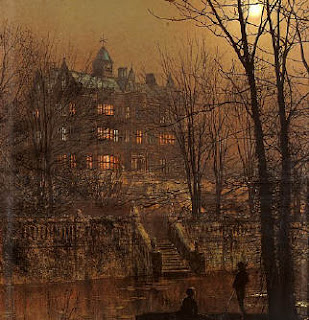The Fall of the House of Usher

"DURING THE WHOLE of a dull, dark, and soundless day in the autumn of the year, when the clouds hung oppressively low in the heavens, I had been passing alone, on horseback, through a singularly dreary tract of country; and at length found myself, as the shades of the evening drew on, within view of the melancholy house of Usher."
How can anyone forget these lines when reading Poe's story for the first time. Poe is one of the first writers that influenced me when I became a writer. He has often been criticized for exaggerating his characters and making them unreal and mad. But what else can you expect from a tale? You can't come to Poe as you would come to Chekhov or Hemingway and expect to find realistic characters. A tale doesn't play in the kingdom of realism - in fact, it shouldn't even be called a short story since it belongs in its own genre: the images that haunt its universe are mirrors, dark forests, big mansion - like Roderick Usher's house - tombs, coffins, and of course mad-morbid-zombie characters. The tale is pure imagination as poetry is pure imagination - reading Poe is similar to reading Coleridge's Rime of Ancient Mariner - we are pulled from our seat and taken into a different universe. On a first reading, we fall into Poe's phantasmagoric mind and vision. Then as we go further, like descending into a maelstrom, we fall into our own inner self; our own dark hole; our own dark existence. We become Roderick Usher; we become the mad murderer in The Tell-Tale Heart; we become, in the end, Edgar Allan Poe. It's normal if we refused to see ourselves as Poe would want us to, but once we have catch a glimpse of our reflection, we will never forget Poe - we will never forget our rejected-self
How can anyone forget these lines when reading Poe's story for the first time. Poe is one of the first writers that influenced me when I became a writer. He has often been criticized for exaggerating his characters and making them unreal and mad. But what else can you expect from a tale? You can't come to Poe as you would come to Chekhov or Hemingway and expect to find realistic characters. A tale doesn't play in the kingdom of realism - in fact, it shouldn't even be called a short story since it belongs in its own genre: the images that haunt its universe are mirrors, dark forests, big mansion - like Roderick Usher's house - tombs, coffins, and of course mad-morbid-zombie characters. The tale is pure imagination as poetry is pure imagination - reading Poe is similar to reading Coleridge's Rime of Ancient Mariner - we are pulled from our seat and taken into a different universe. On a first reading, we fall into Poe's phantasmagoric mind and vision. Then as we go further, like descending into a maelstrom, we fall into our own inner self; our own dark hole; our own dark existence. We become Roderick Usher; we become the mad murderer in The Tell-Tale Heart; we become, in the end, Edgar Allan Poe. It's normal if we refused to see ourselves as Poe would want us to, but once we have catch a glimpse of our reflection, we will never forget Poe - we will never forget our rejected-self


Comments